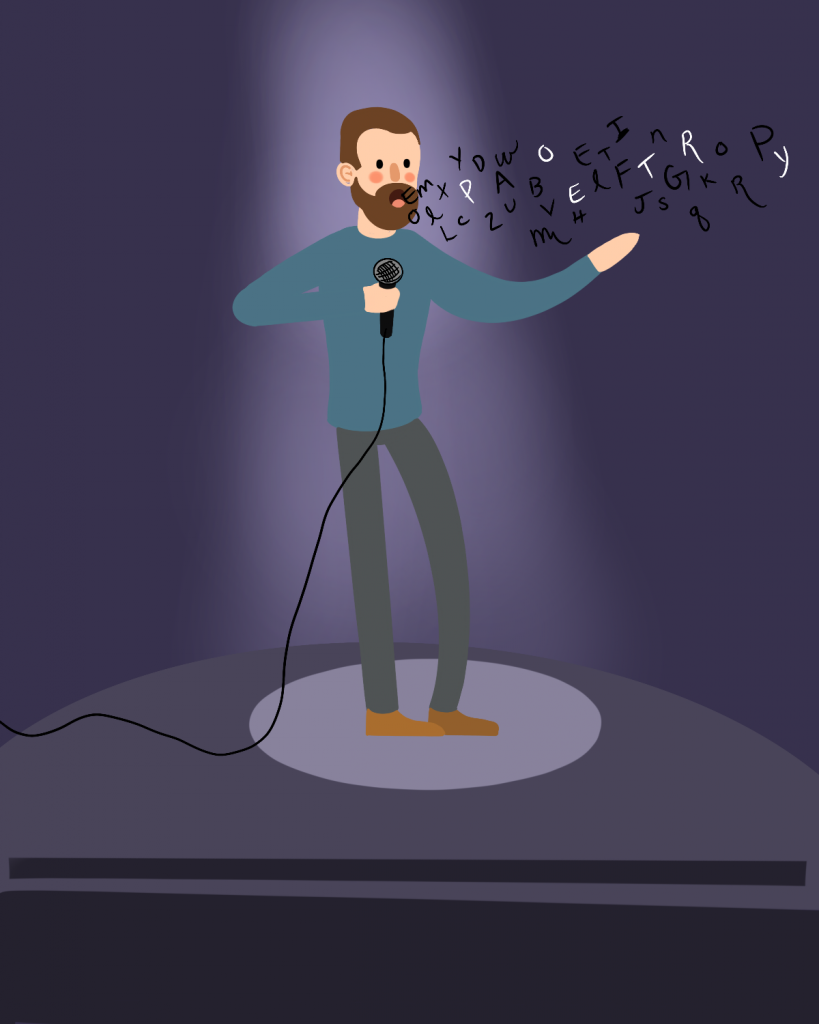
On Thursday, with about 10 minutes to go before the 7 p.m. kickoff of the Bundy Museum of History and Art’s monthly Open Mic Poetry Thursday, traveling poet, Binghamton resident and event organizer J. Barrett Wolf waited patiently for guests to arrive. The weather outside was dismal, the building was empty and Wolf cracked a smile.
“I was just thinking it would be really amusing if no one showed up,” Wolf said. “I mean, it hasn’t happened yet — this would be the first time.”
It wouldn’t happen that night, as a small group of writers and supportive friends took refuge from the cold and rain inside the Bundy Museum Annex. Held on the third Thursday of every month, the event offers an opportunity for any interested poet to perform five minutes worth of material. Performances are recorded and usually streamed on WBDY-LP 99.5 FM, the Bundy Museum’s radio station, although technical issues have made this a work in progress.
Wolf is no stranger to the Binghamton creative writing scene, moving to the area 14 years ago and running his first open mic less than a year later. After a long stint at RiverRead Books, Wolf found a new home in the Bundy Museum. He has long-term plans to establish a writer’s center out of the museum servicing the Southern Tier, and discussed the value in building connections within the city’s poetry community with events like these.
“I’ve always valued the interaction and the networking that comes with bringing poets together,” Wolf said. “Different styles, different ways of delivering, different ways of creating language and using language.”
The first poet to perform was Martin Bidney, a Vestal resident and a professor emeritus of English and comparative literature at Binghamton University. Previously focusing on scholarly writings, Bidney came to poetry later on in his life, when an episode of carpal tunnel made it impossible for him to play the violin for several months.
“When I retired, I prefer the word retooled because I acquired a new life altogether,” Bidney said. “I now write poetry.”
To say that Bidney writes poetry undersells his prolific nature. Since his retooling, he has published 26 books of poems and is currently working on his 27th. His style is eclectic and frequently incorporates translations of historical poets from German and Russian, languages he is proficient in. His performance at the open mic came from his most recent book, “The Rumi Interview Project,” in which he translates the ancient poet Jalāl al-Dīn Muhammad Rūmī’s work and replies in 99 distinct sonnets. For Bidney, the joy of working with older poets is in their commitment to rhythm and routine.
“They were faithful to the forms of the verse — I’m really keen on that,” Bidney said. “I’m keen on having the steady rhythm, I never write free verse. I’m a violinist and a singer, and what gives me pleasure in life is the beat of the verse.”
Eschewing the beat of the verse altogether, the event’s other performer was Willow Paykin, an undeclared freshman. Her poem was a free-verse account of the previous weekend, in which she met a drug addict referred to as “Whiteboy Rob” on a Brooklyn train and started talking to him, eventually tagging along with him for the night.
“I was feeling really depressed leading up to that, and I knew that he seemed like a dangerous guy, but I was at a point where I didn’t care,” Paykin said.
The night that followed served as a powerful experience for Paykin, and helped her break out of a cycle of numbness that she described feeling before. She is still in contact with “Whiteboy Rob,” and said she texted him a few days prior to her performance to tell him about the poem.
“I think that there’s a stigma against homeless people, and this stigma is another obstacle in the challenge of helping them and lifting them up, so I wanted to sort of show that these are people too,” Paykin said.
Wolf said the performances illustrate the diversity and complexity of an art form that is often misunderstood by individuals whose only connection to poetry is reading a few out-of-context poems in high school — a misunderstanding he hopes to correct.
“I spend a lot of my life explaining to people, poetry is not what you think,” Wolf said. “Poetry is not this dry use of language that doesn’t relate to your day-to-day life. Any given poem? Sure, it may not be about things that you know or are into. But there’s poetry out there about life, and love, and death, and traffic and breakfast. There’s poetry out there that speaks to regular people’s day-to-day lives, and we need to go out and show people that.”


